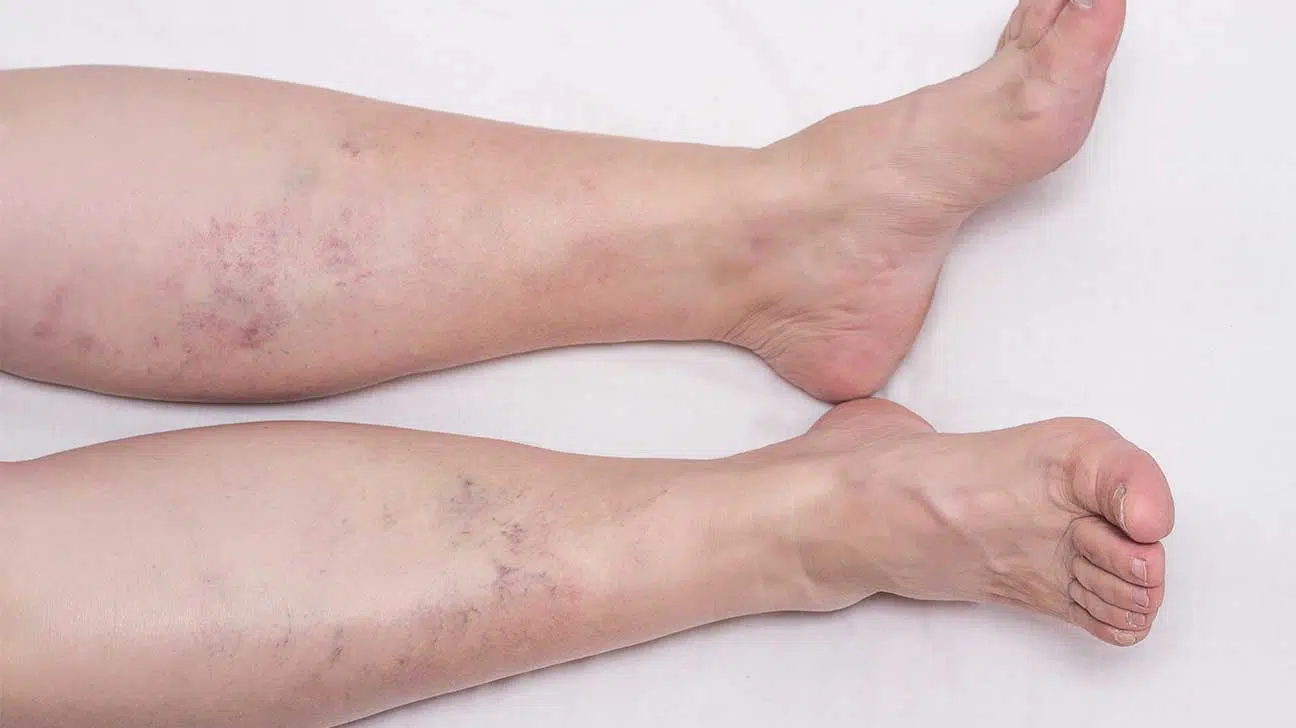
Chronic venous insufficiency is a medical condition that can develop as a result of intravenous (IV) injection of illicit drugs such as heroin, cocaine, and meth.
According to research, chronic venous disease is just one of many harmful consequences that can develop as a result of unsafe IV drug use.
What Is Venous Insufficiency?
Venous insufficiency is a chronic medical condition that occurs due to malfunctioning valves in the veins.
According to Johns Hopkins University, this is when veins in your legs don’t allow blood to flow back up to your heart properly.
What Causes Venous Insufficiency?
Chronic venous insufficiency (CVI) is a condition that is not exclusively tied to IV drug use.
It can develop as a result of a past blood clot in the leg veins, including opioid-induced blood clots, deep vein thrombosis (DVT), or another medical issue such as a past leg injury.
But for those who do inject drugs, this chronic condition can develop as a result of injecting substances like heroin intravenously (into a vein).
Venous insufficiency is associated with drug injection into the:
- legs
- arms
- feet
- hands
- groin
Other Complications Of Injection Drug Use
Intravenous drug use is a risk factor for many physical health complications, beyond just vascular damage and venous disease.
Some of these health conditions include:
- bloodborne diseases (e.g. HIV, hepatitis C)
- pulmonary complications
- soft tissue infections
- cellulitis
- necrosis
- abscesses
Harm reduction practices, such as cleaning the injection site prior to drug use, can help mitigate the risk of infections and other associated consequences of IV drug use.
What Are The Symptoms Of Venous Insufficiency?
Venous insufficiency from injection drug use can be identified by a number of symptoms — although this can vary somewhat based on comorbidities and your substance use history.
Signs and symptoms might include:
- pain while walking
- varicose veins
- brownish-color veins
- venous ulcers
- swelling in the ankles and legs (edema)
- painful leg cramps
- muscle spasms in the legs
- itching and tingling
- red, swollen, crusted skin
- thick, hardened skin on the legs
- blisters or ulcers on the legs that are slow to heal
What Are The Risk Factors For Venous Insufficiency?
Venous insufficiency has a known association with injection drug use. But it can also be caused, or influenced, by other behaviors and risk factors.
The following can put you at increased risk:
- smoking
- older age
- family history of this condition
- being overweight
- being female
- being pregnant
- tall height
- history of deep vein thrombosis (DVT)
- sitting or standing for long periods of time
Injecting drugs into a lower extremity, such as the legs or feet, is associated with an increased risk of developing this condition.
However, this can also develop if you primarily inject into the arms, hands, or other areas of the body.
What Happens If You Have Venous Insufficiency?
According to the U.S. National Institutes of Health (NIH), this condition can be effectively managed to help improve quality of life if it is caught in its early stages.
For severe cases, or late-stage cases of venous insufficiency, clinicians may recommend more invasive treatments, such as surgery.
Complications of untreated CVI can include:
- sepsis
- septicaemia
- endocarditis
- chronic venous leg ulcers
- cardiovascular or kidney problems
- severely damaged veins
- lower limb amputation
Treatment For Chronic Venous Insufficiency
A treatment plan for venous insufficiency will depend on the severity of your condition, symptoms, and factors related to your drug use.
Treatment for venous insufficiency among people who inject drugs (PWID) may include:
Lifestyle Changes
Certain lifestyle changes and behaviors can help mitigate or address issues associated with this chronic condition in patients.
Self-care strategies for this condition include:
- avoid sitting or standing for long periods of time
- elevate your legs while sitting
- exercise regularly
- maintain a healthy weight for your body
- wear compression stockings to improve blood flow
Wound Care
It may be necessary to care for open sores, infections, or other wounds that occur as a result, or independently of your venous condition, as applicable.
Medicine
A prescription medication or over-the-counter medicine like Aspirin may be recommended for relieving specific CVI symptoms, such as swelling or reduced blood flow.
Medical Procedures
More invasive interventions, beyond lifestyle changes or at-home wound care, may be recommended by a healthcare provider if you’re showing severe CVI symptoms.
Recommended medical treatments may include:
- sclerotherapy
- varicose vein stripping (ligation)
- endovenous laser ablation
- phlebectomy
Medical treatments may be recommended if you are experiencing leg pain, skin sores, or a thickening and hardening of the skin on the legs and ankles.
Treatment For IV Drug Abuse And Addiction
Chronic venous insufficiency is a common consequence of intravenous drug abuse, which may require treatment through a drug rehab program to overcome.
Treatment for IV drug abuse commonly includes:
- inpatient rehab programs
- substance abuse counseling
- individual and group therapy
- behavioral therapies
- peer support groups
- medication for opioid use disorder (e.g. methadone)
- relapse prevention
- aftercare support
Medical follow-up for venous disease may be required if your condition has advanced to a severe or advanced stage.
Get Help For IV Drug Use Today
If you or a loved one are struggling with drug misuse, our team may be able to help you find a treatment program that’s capable of meeting your needs.
Call our helpline today to find the best treatment options for drug abuse and addiction at a treatment center near you.


